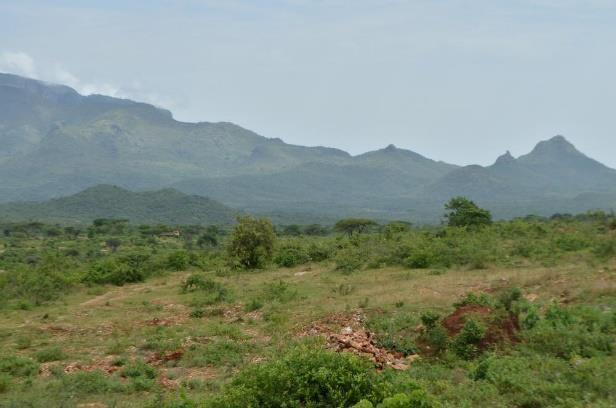
4 minute read
II.2.2. A weakened local leadership
RECOMMENDATIONS
To CSOs/legal aid service providers:
Advertisement
Give audience to women and communities aggrieved by industries and ensure referral to the justice actor most in state to solve the case at stake.
To the Justice, Law and Order Sector:
Set up a system of fast tracking for cases related to extractive industries handled in Courts of law. Fast track the adoption of missing legislation to hold accountable the companies and State agents acting in the context of industrial exploitation of natural resources.60
To national government and parliament:
Increase of the visibility and accessibility of non-judicial State grievance mechanisms such as the Equal Opportunities Commission and the Uganda Human Rights Commission, which remain largely unknown to the wider public.
II.2.2. A weakened local leadership
The arrival of extractive industries has impacted the local leadership’s ability to intervene as justice actors. In spite of their crucial role in handling all sorts of conflicts at community-level, especially for women who resort more often to informal and local dispute resolution mechanisms,61 traditional and local authorities appear powerless in solving many of the issues involving mining or oil industries.
Leaders and community members alike shared this perception. One Chairman LCI in Hoima reports:
"As local council leaders, we do not have much power to do anything. In case of [oilrelated] issues, we just sit with the [Resettlement Planning] Committee and we tell them to help us.[…] For us, we just help people on issues like theft, solving family issues but for anything to do with the higher authorities, we just call upon our Committee to help us."62
Similarly, a religious leader in Buseruka recounted how he referred a woman with a landrelated family issue that arose during the compensation process to the company-designated officers.
Those accounts highlight a tendency for company structures to replace existing justice pathways for handling issues falling within their mandate – acquisitions, resettlement, compensations. In a previous report, ASF found that in Moroto, local justice mechanisms such as Local Councils were not consulted to adjudicate on business-related issues, concluding that the latter’s “lack of formal recognition also aggravates the power imbalances between the communities and the business, leaving cultural leaders with no authority to summon representatives of mining industries.”63 Our data supports those findings in the oil industry context as well.
60 Several gaps in the policy and legislative frameworks were highlighted in a baseline conducted by the Ugandan Consortium for Corporate Accountability. See UCCA, The State of Corporate Accountability. 61 HIIL, Justice Needs, 67-68. 62 Interview with Nyahaira Village Chairman LC1, Buseruka Sub-County, Hoima District, 10 May 2018. 63 ASF, Human Rights Implications, 45.
In Moroto, where companies fail to offer remedies, women seem to be resorting to actors with a high-perceived degree of authority or legitimacy. The police are often consulted about mining-related problems, even for issues that do not fall within their mandate. Women also present their concerns to Sub-County leaders or NGOs. This is however not a new phenomenon, and our data does not enable us to see if resort to those actors increased with the growth of EIs.
What is clear on the other hand is a reluctance to consult Elders for EI matters, which is not only linked to perceptions of incompetence but also of corruption:
"Our land was being grabbed by the companies in disguise of ignorant Elders’ approval who barely know nothing but were just bribed with little money."64
While such remarks highlight the perceived disempowerment of the local leadership in a context of heightened power imbalances, they also reveal a tendency from companies to use this local leadership as a gateway to the local communities and resources –not always necessarily with the bad intentions implied by our respondent.
Indeed, informal discussions with company and government representatives highlighted the companies’ strong reliance on the local leadership not only for consulting communities, but also for solving conflicts arising as a consequence of their activities. Local leaders are involved in handling grievances at different levels. Many of them are members of project affected people (PAP) committees or chosen as Community Liaison Officers (CLOs), who are first line actors in corporate grievance systems (see below). Further, leaders with high perceived authority at local level are also called upon by companies and government officials when conflicts escalate, including between individuals of the communities.
Eventually, there results an apparent contradiction between a de-structuring and strengthening effect of EIs on the local leadership. Either ways, there is a potentially adverse impact on women, as the structures familiar to them are being undermined on the one hand, and patriarchal community mechanisms are being reinforced on the other. At this stage, our data enables us to point at the knowledge and practice gaps on which this ambivalence is rooted. Firstly, conflicts arising in EI contexts are often complex knots of family, land and other issues, multiplying entry and end points for conflict resolution and adding to the difficulties – or opportunities - for justice-seekers to find adequate pathways. More importantly, stakeholders at all levels – industries, government and civil society – have rushed towards local leaders as a medium to access communities without much questioning about who falls under this category, the role of its various members and their (perceived) legitimacy.
Kosiroi limestone extraction site in Tapac District
64 FGD with Community Leaders, Tapac Sub-County, Moroto District, 19 April 2018, transcript.






